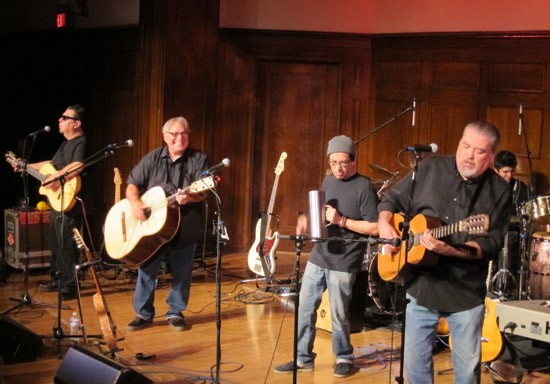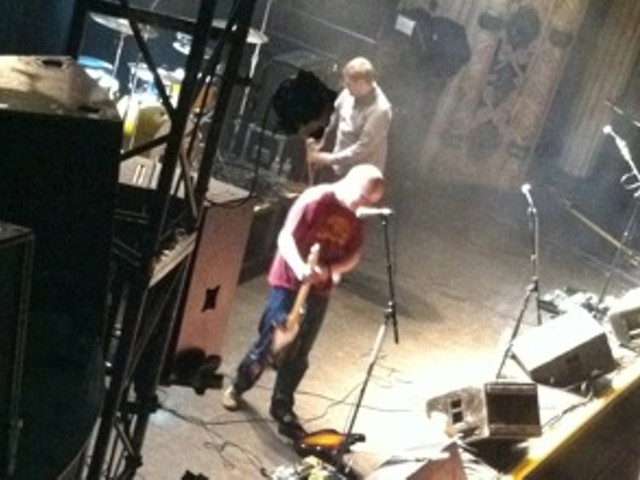Los Lobos
The Sheldon Concert Hall
February 26, 2012
Rock bands and followers of rock bands, heed this advice from just another band from East L.A. Like these veterans, you'll be old soon enough, and your cool will fade. So start now: Work on your soul patch, find some vintage Ray Bans, dress in black and learn some cumbias.
It probably won't work, but you don't have a better plan than Los Lobos.
On the stage of the Sheldon Concert Hall (3648 Washington, 314-533-9900), the five friends, together from the start, plus a young, newly-added hellion of a drummer in Enrique "Bugs" Gonzalez, attacked the first note to last before a sold-out crowd. Most were old enough to also have been with them from the start, many young enough to get off on their unpredictably excellent album of Disney tunes ("The Monkey Song" from The Jungle Book was an early set highlight), many more still high from the band's last sweaty outdoor festival gig. By the looks of David Hidalgo's half-open eyes and by the sound of his rapturous solos, all on acoustic instruments (unlike his foil César Rosas, he wouldn't touch an electric guitar all night), he was still high as well. Even the greatest of players, and he is one of them, couldn't find such riffs and runs without substantive aid.
Arrayed stage left to right, Steve Berlin (saxophones, flute and keys), Hidalgo (guitars and accordion), Louie Pérez (guitars), Conrad Lozano (bass) and Rosas (guitars) lit into opening song "Will the Wolf Survive," a tune that once often closed out their shows, at least before the mega-hit remake of "La Bamba." It's still one of the best band theme songs in popular music, a story and a symbol of struggle and survival that Los Lobos, despite all the awards and acclaim, still expresses with conviction.
A standing ovation greeted the musicians before they played a note. "We're Los Lobos, not Los Lonely Boys," Rosas joked. Befitting the surroundings, the band emphasized its more acoustic material, its cumbias and polkas, all played with the warm spontaneity of a street party in the barrio, but always sharp and in the pocket. The second song, "Yo Canto," from the band's most recent album Tin Can Trust, should have gotten the crowd moving with them, but that would come later.
The set's first turn towards Kiko turned out to be the percussive lament "When the Circus Comes to Town," beautifully sung by Hidalgo, followed by "I Wan'na Be Like You (The Monkey Song)" and the first nod to Latin soul, "Hearts of Stone," from Good Morning, Aztlán, and then back to Kiko for "Dream in Blue" and the night's first snatch of a cover, Traffic's "40,000 Headmen," with a terrific, fitting flute solo from Berlin. And then came two more Spanish language songs, "Maricela" from Colossal Head and "Venganza de Los Pelados" from the 2004 album The Ride to close out the first set.
After the intermission the band opened up with "La Pistola y El Corazón," "Canto a Veracruz" and the Kiko classic "Saint Behind the Glass," letting Pérez, who had previously been more than content to support the rhythms with a flash and flurry of folkloric strums on guitar and jarana, take his first vocal turn. Like Berlin and bassist Lozano, Perez is integral to the soul of the band, writing with Hidalgo, often supplying the lyrics, even as his boyhood friend sings them as he never could.
Meanwhile, Rosas and Hidalgo, as usual standing on opposite sides of the stage and trading jokes back and forth -- even debating setlist order at one point -- played off each other: Rosas is the Chuck Berry and T-Bone Walker to Hidalgo's Dylan and Hendrix, and as the jamming solos of the night's longest song, "West L.A. Fadeaway," wound down, Rosas dedicated a song to Chuck, and pushed the band into two numbers from the first album. "Don't Worry Baby" and "I Got Loaded" both proved they'd be nowhere without the rhythm & blues and rock & roll archetypes they mastered when they were once so young.
The night ended with semi-permanent set closers "La Bamba" and "Good Lovin'" (the latter as much a nod to the Dead as the Rascals), and an encore of two Latin numbers, one I couldn't place and one I could ("Guantanamera"), and then the great, chord-twisting, time-shifting "Mas y Mas," with Bugs getting a full-on, fully-sick drum solo.
At that point, everyone, young and old, was dancing, or at least trying to. The wolves had hunted our collective inner muévete down.
Notes and setlist are on the next page.






